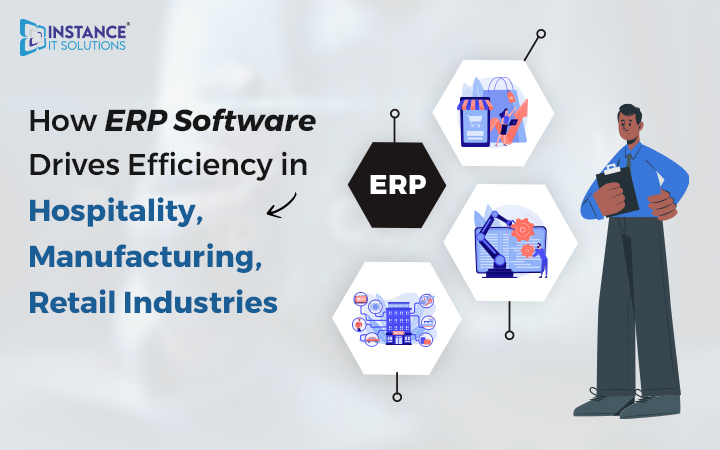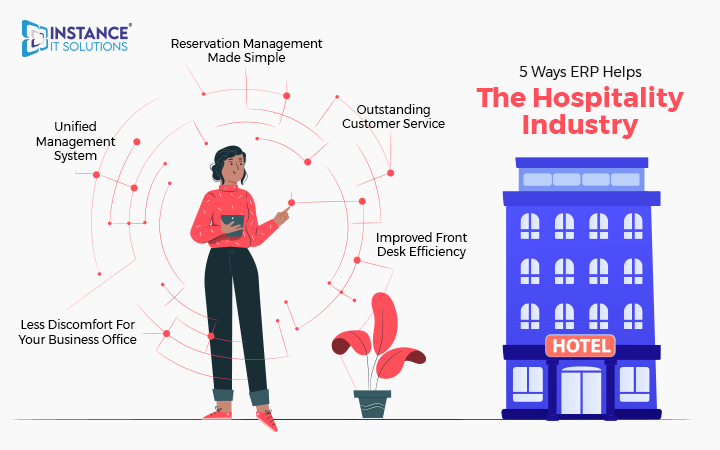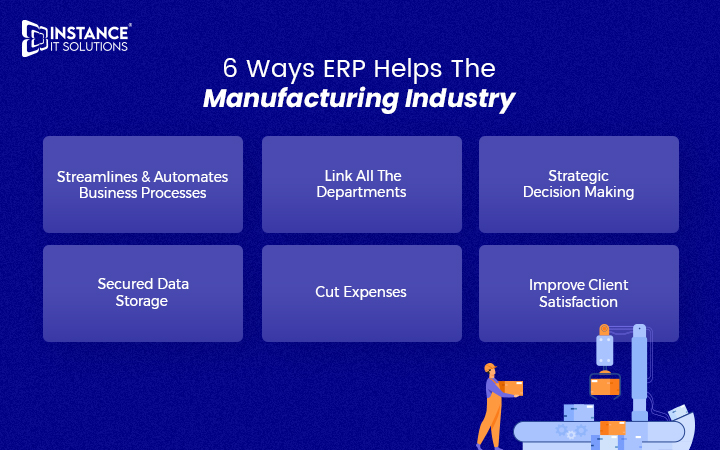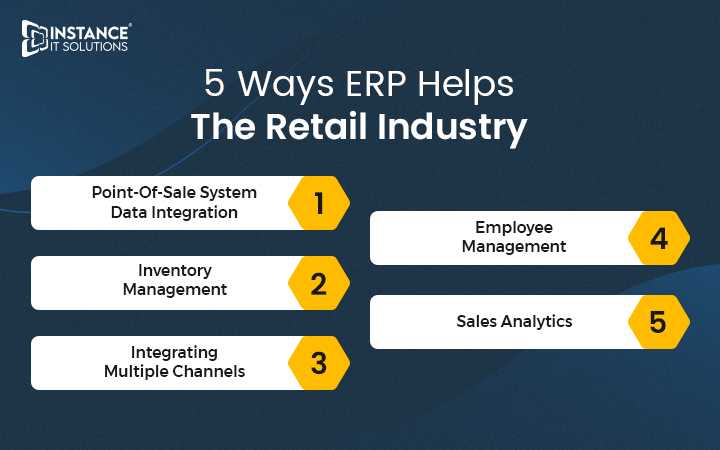Industry Specific ERP Software: Unleash Peak Performance 2024
-

-
Shivendra Saxena
27 Oct, Fri
Content

Introduction
An organization can cut operational expenses, increase productivity, and optimize its business processes with the aid of ERP software. Additionally, it can offer enterprises real-time visibility into crucial business KPIs, assisting them in making better decisions.Â
Furthermore, ERP software supports the integration of numerous systems and data sources and can assist firms in ensuring compliance with various laws and standards.Â
This can promote excellent internal communication and collaboration inside the company as well as increase the accuracy and dependability of business data.Â
ERP In The Hospitality Industry
One of the most essential tools for the hospitality sector today is an ERP; it helps you take advantage of the market potential, maximize the benefits of cutting-edge technology, and streamline and improve hotel operations.Â
ERP systems for the hospitality sector can assist managers in optimizing procedures, hospitality, and customer service for smoother functioning of the entire system.Â
As more hotel managers adopt ERP software, the previous PMS, or property management system, is gradually being replaced by this more efficient alternative.Â
The data gathered from the solely front office activities of account receivables, sales, and phone management is run through a PMS system. A hotel business ERP software may easily take over the overall hassles of the sector, from the front desk to the back end.Â
5 Ways ERP Helps The Hospitality Industry

Unified Management SystemÂ
The concentration of all activities into a single system is one of the most important advantages of using an ERP hospitality solution.Â
Even if they have many locations, management can have a bird's eye perspective of all internal operations owing to an ERP. Hospitality managers can assign several jobs, such as housekeeping, room service, and maintenance, using the program.Â
Additionally, it removes the possibility of human error. ERP keeps track of and records every step of the process, sending out updates and warnings as needed.Â
This aids managers in maintaining control and ensuring that tasks are completed on time. Managers may make informed decisions based on real-time data thanks to the information being centralized into a single system. Consequently, less time is going to be needed for manual data collection and processing.Â
Reservation Management Made SimpleÂ
An ERP hospitality system can enhance reservation administration in addition to centralizing management tasks. In recent years, hotel and resort reservation systems have become more intricate. Customers can now use a variety of websites and devices to see listings and make bookings. This level of intricacy increases the potential for error and detracts from the guest experience. Merging records and enhancing performance are two plus of hotel ERP systems. Â
They give managers a summary of the room availability, average occupancy rates, and status updates. The software system can frequently estimate upcoming occupancy trends more accurately and efficiently.Â
This gives managers the ability to maximize revenue and make better judgments. An ERP hospitality system can lessen employee workload by improving reservation administration.Â
Outstanding Customer ServiceÂ
In the hospitality industry, client service is paramount. Your business's success depends on your client's satisfaction. Therefore, the way you handle client complaints can make or destroy the business. Modern hotel ERP solutions combine customer service management into a single user interface. They also let you customize the services you receive.Â
With these, you may keep tabs on a visitor's preferences for food, lodging, and dining options, as well as learn more about how often they visit.Â
That's not all, though. By providing clients with tailored offers, you can also use it to boost reservations and conversions. This improves your financial standing. Additionally, by providing better service, you encourage repeat business from your customers.Â
Improved Front Desk EfficiencyÂ
In a hospitality setting, reception always has a lot of chores to keep on track. You can boost productivity and improve the front desk process with ERP software. Everything your front desk staff requires will be available to them in one location. No matter if they are changing rooms, offering discounts, or providing services like wake-up calls.Â
Less Discomfort For Your Business OfficeÂ
Working with an ERP system in the hospitality industry can significantly simplify life for your company office, especially if you manage several locations.Â
You can cut back on your overhead costs by streamlining your financial management procedures. Additionally, you can view the success of your company and streamline reporting for numerous locations or departments with ease.Â
This was all about ERP for the hospitality industry. Now, we move on to how it helps the manufacturing industry. Keep reading if you own or manage a factory.
ERP In The Manufacturing Industry
Every industry has been significantly altered by technology, but the manufacturing sector has been most severely impacted. Big data, IoT, and digital warehouses have all witnessed major developments in the manufacturing sector, as have modern supply networks. Given how dynamic and competitive the manufacturing sector is, organizations in this sector must have integrated solutions for boosting productivity, cutting expenses, and increasing revenue and profits. One of the industries with the quickest growth and most competition is manufacturing.Â
Because of the intense rivalry in this market, producers scramble to keep up with the escalating and swiftly shifting needs of consumers. Manufacturers must be able to streamline all procedures and increase productivity if they are to succeed. Utilizing ERP software is just one of the various measures taken by the manufacturers to address this. The system is intended to streamline overall processes, boost productivity, and cut expenses.Â
6 Ways ERP Helps The Manufacturing Industry

Streamlines & Automates Business ProcessesÂ
For industrial firms, a full ERP solution fosters automation and optimizes business operations. The procedures have been streamlined so that all data is accessible from a single location and is fully visible across all sectors, including development, designing, inventory, procurement, production, finance, sales, delivery, and more.Â
Every employee on staff has access to real-time information about the production status without needing to rely on a particular person or group.Â
For instance, the design team can keep track of how production is going and inform the finance and purchasing departments when more raw materials are needed.Â
This boosts output, enhances system effectiveness, and makes it possible for companies to fulfill their contractual commitments to clients.Â
Link All The DepartmentsÂ
The manufacturing company's financial department, human resources, inventories, sales, customer service, and other departments are all being integrated using ERP.Â
This implies that the business does not have to independently and separately supervise each department. Managers can receive complete data from each department in real time and can coordinate all departments through a single system.Â
Strategic Decision MakingÂ
A whole manufacturing ERP solution enhances an organization's capacity for decision-making. It provides in-depth insights and visibility into every division and business process, enabling the organization to make decisions about its operations that are prompt, precise, and informed.Â
When manufacturing companies have access to crucial performance data like overall sales, sales margin, etc., they are better equipped to stay on track with their goals and make the required internal decisions as needed.Â
All internal departments and processes are fully visible with ERP for the manufacturing industry, which helps management streamline everyday operations.Â
Secured Data StorageÂ
ERP provides a secure space to store all kinds of business data. Using paper notes is very wasteful and unsafe because they can be lost or damaged easily. With the help of ERP, data is not only stored, but the business gets insightful reports that help in informed decision-making. It enhances company output and increases overall business.Â
Cut ExpensesÂ
Due to the automated, streamlined, and real-time business information provided by advanced ERP software, manufacturing businesses can lower their overall operational costs. The ERP for manufacturing reduces labor costs by raising worker productivity, while losses are reduced by improved precision and decreased error rates.Â
Excess inventory and warehousing costs can be eliminated with the ability to track inventory effectively and link it with production planning. Finally, increased organizational visibility aids in cost-cutting efforts on the part of management.Â
Improve Client SatisfactionÂ
On-time delivery of goods is a crucial performance indicator for manufacturers, and it may be increased by careful production planning, improved inventory management, optimized process scheduling, and coordination of distribution routes.Â
Deliveries must be made on time in order to maintain client satisfaction. Manufacturing ERP solutions provide data in real time so that decision-makers can always have a realistic understanding of inventory levels.Â
This is all on the enterprise resource planning system for manufacturing. Here we move on to how ERP helps the retail industry. In case you have any queries up till now, please comment.Â
Experts from Instance IT Solutions would be glad to help you out.Â
ERP In The Retail Industry
Regardless of the size of the company, ERP is now a must for the retail sector. ERP systems have become crucial for brands in order to survive and keep up with changing consumer demands and intensifying competition. It is a collection of adaptable apps that helps merchants effortlessly integrate and manage all key processes, such as managing several locations for stores, constantly shifting stock, price changes, product discount offers, and much more.
5 Ways ERP Helps The Retail Industry
 Point-Of-Sale System Data IntegrationÂ
Point-Of-Sale System Data IntegrationÂ
Real-time data is greatly facilitated by the modern integration of ERP tools with POS systems (both hardware and software). ERP, or enterprise resource planning, extends the benefits of point-of-sale systems by ensuring that all transactional data is immediately reflected in retail locations and the primary ERP tool.Â
Inventory ManagementÂ
Fast-moving consumer goods (FMCG) make up the majority of the retail industry. The demand for these goods is susceptible to daily fluctuations.Â
Having extra or out-of-stock inventory could undoubtedly result in significant financial losses. In an effort to avoid disasters, retail businesses have started integrating ERP software to manage inventory movements and alert workers in case of shortages. It can also evaluate historical consumption patterns to forecast changes in demand.Â
Integrating Multiple ChannelsÂ
Retailers frequently require a variety of channels to maintain a smooth operation throughout their businesses. All retail channels are integrated into a single platform by an ERP system, enabling real-time information sharing between departments.Â
Sales AnalyticsÂ
Retailers can gain insights into their real-time operations, such as inventory management and omnichannel order fulfilment, by integrating predictive analytics with contemporary ERP systems. ERP software also assists businesses in identifying essential goods for sustaining profits. Businesses can ensure stock availability to capture the most sales once they can identify such products.Â
Employee ManagementÂ
ERP solutions boost output by cutting costs and minimizing employee repetition. ERP software helps retailers manage their human resources.Â
With the use of ERP, employees can more readily make adjustments to their daily operations and prevent repeating tasks. As a result, it raises the operational effectiveness of employees, helping them to fulfil deadlines and boost revenue for the company.Â
Administrators may issue new assignments, keep track of targets, and accomplish many other things thanks to the ERP system.
Conclusion
In conclusion, Enterprise Resource Planning (ERP) systems have emerged as indispensable tools for modern businesses. They streamline operations, enhance efficiency, and improve decision-making by integrating various departments and data streams into a unified platform. ERP's ability to provide real-time insights, automate routine tasks, and optimize resource allocation makes it a crucial asset in a competitive business landscape.Â
As organizations continue to adapt to ever-evolving market demands, the strategic implementation of ERP solutions remains paramount.Â
However, it's essential to remember that ERP success hinges on proper planning, training, and ongoing support. In an increasingly digital world, embracing ERP systems will be a defining factor in a company's ability to thrive and innovate.Â
We are trusted by over 650+ clients.
Join them by using our services and grow your business.
Request a callbackRequest a callback


 Contact Us
Contact Us
